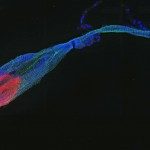Lien vers Pubmed [PMID] – 12499174
Antimicrob. Agents Chemother. 2003 Jan;47(1):87-94
Plasmodium falciparum chloroquine resistance was first detected in Cambodia in the early sixties. Treatment with chloroquine was abandoned 20 years ago. In vitro chloroquine sensitivity monitoring indicates that all eastern Cambodian isolates were sensitive to chloroquine, whereas most isolates collected from western provinces displayed reduced susceptibility to chloroquine. This indicates that the rate of chloroquine resistance remains high and stable in this region in the absence of chloroquine pressure. Characterization of codons 72 to 78 and 218 to 220 of pfcrt revealed six distinct haplotypes, four of which had never been described. The frequency of each haplotype depended on the geographical origin of the samples. The CVIETIF//ISS haplotype was detected in 92% of western Cambodian isolates and in 11% of isolates collected from the eastern province, where CVMNKIF//ISA and CVIDTIF//ISS predominate. The detection of an intermediate haplotype from a susceptible area with 76T/220A, suggests that acquisition of chloroquine resistance might be a stepwise process, during which accumulation of point mutations modulates the response to chloroquine. The association of the K76T mutation with chloroquine resistance was not clear. The mutation was detected in resistant and susceptible samples, suggesting that additional factors are involved in chloroquine resistance. By contrast, the pfcrt D/N75E mutation was strongly associated with the in vitro chloroquine resistance in Cambodian isolates. The N86 allelic form of pfmdr1 was detected in all isolates, consistent with a poor association with resistance to chloroquine. This indicates that in vitro resistance to chloroquine was associated with accumulation of point mutations in pfcrt.

